Today’s podcast is brought to you by the power going out. Did I have a “Plan B?” More than some people.
Send me an audio comment!
Post in the forums!
Art. Education. Technology.
Today’s podcast is brought to you by the power going out. Did I have a “Plan B?” More than some people.
Send me an audio comment!
Post in the forums!
Are we helping other teachers see just how easy technology can make things? We should be.
Send me an audio comment!
Post in the forums!
That’s right, it’s my 100th podcast! Woohoo!
I’m tired and it’s a school night, so I’ll forgo any lengthy explanations. A special thank you to everyone who made this all possible, especially you, the listeners.
Missed out on leaving an audio comment? Well, send one in now!
What? Oh, sorry – I was just posting something in Chris Craft’s new Open Source Classroom Forum.
What’s a forum? Well, I’m glad you asked!
Forums are another kind of online meeting place. They’re like chat rooms, since multiple people have access to the same space, but they’re also like blogs, since what’s written will usually stay online for a long time. I guess that puts them in the middle of the venn diagram.
Hm, that seems to be a recurring theme here.
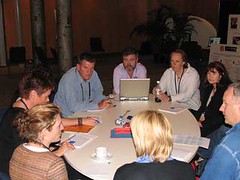 In any case, forums can be better and worse than blogs. Better, because it’s easier to find like-minded individuals interested in what you have to say, but worse because it’s not your personal space.
In any case, forums can be better and worse than blogs. Better, because it’s easier to find like-minded individuals interested in what you have to say, but worse because it’s not your personal space.
That drawback is more of an issue to some people than others. If you post things on a forum that are too far off topic, or do something else that a forum moderator doesn’t care for, you could find your posts deleted or in some cases even get your account banned. There’s a lot less censorship in the blogosphere, although I know there are exceptions to that rule.
So which is better? That’s like asking if a ball peen hammer is better than the traditional claw hammer. While there is some crossover, both of them are meant to be used for different purposes. I’ve found that many people who post regularly on forums also have blogs, and they say different things on each.
My sister, for example, is a regular participant in a punk rock forum. She also has a LiveJournal blog that she uses to communicate with her friends. While some of them are also participants in the punk forum, others aren’t, so she uses her blog to talk about the random happenings of her life and only posts a little about punk rock there.
 This is for the best, I think. While I enjoy punk covers of popular ’80s songs as much as the next guy, I’ve never heard of even half of her favorite bands. The Dropkick Murphys rock, though. You can’t beat loud punk rockers playing Amazing Grace while being accompanied by a bagpipe player.
This is for the best, I think. While I enjoy punk covers of popular ’80s songs as much as the next guy, I’ve never heard of even half of her favorite bands. The Dropkick Murphys rock, though. You can’t beat loud punk rockers playing Amazing Grace while being accompanied by a bagpipe player.
And of course forums aren’t just for people with nonconformist hairstyles. Leo Laporte runs one of the best forums for tech support I’ve ever seen, Chris Marquardt has a forum on digital photography, The Discovery Educator Network has a wonderful forum for people interested in integrating technology into education, and like I mentioned earlier, Chris Craft has a forum on open source software in the classroom.
There’s one more forum out there, but I don’t know if you’d be interested or not.
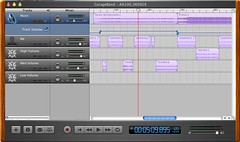 Yesterday I started editing my 100th podcast. It’s not done yet, but I’m happy with what I have so far and I think you’ll be too when you hear it.
Yesterday I started editing my 100th podcast. It’s not done yet, but I’m happy with what I have so far and I think you’ll be too when you hear it.
I have noticed something, though. Almost all of my previous podcasts were made by me simply talking into a mic, throwing in some background music, then uploading the mp3. Most of my editing was done while writing the script, with the exception of the occasional moment where I read the same line twice.
But my 100th episode is different. I have lots of clips to play, including the ones provided by listeners like you. (Thanks, by the way. I’m still accepting more if you want to send one in.) Now I have to drag audio back and forth, adjust music volumes, readjust music volumes, wonder why those last five clips I imported deleted themselves, and of course import a 45 minute recording because I want to use the first 60 seconds.
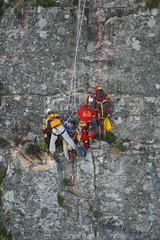 In short, this isn’t easy. If I had to do all of this on a regular basis you wouldn’t be getting 3 podcasts a week from me, especially now that school’s started again.
In short, this isn’t easy. If I had to do all of this on a regular basis you wouldn’t be getting 3 podcasts a week from me, especially now that school’s started again.
I suppose there’s a lesson to be learned here. Just because you can do a lot of nifty things with a program doesn’t mean you need to. Yes, PowerPoint offers enough transitions for you to use a different one on each of your slides, but will that really help your presentation? Only if you’re doing a presentation on the transitions.
When you’re working on audio, video, PowerPoint, or even an MS Word document, it helps to find or create a template in the beginning and just use it over and over again. When you’re giving information to your students you should not be spending half an hour finding just the right animated clip art for your PowerPoint on Indonesia when you only spent 5 minutes typing up your bullet points. And really, that dancing baby just isn’t cool anymore.
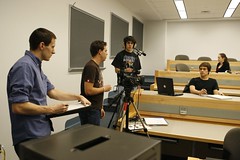 This time around I talk about personal professional development.
This time around I talk about personal professional development.
Today’s the first day of school for students. Summer vacation is but a memory, as now it’s time for all of us to buckle down and do some serious learning.
Yes, I said “all of us.” You may be a teacher, but you’re not exempt from learning until you’re dead. (And perhaps not even then, but I digress.)
There are many ways for teachers to expand their skills as teachers. There are inservices (well, at least the good inservices…), graduate courses, and more literature available for self-paced study than you can shake a stick at.
 Of course there’s another way, too. Remember all of the times a teacher has asked a class to write a report on something? Did that teacher honestly need to know more about that subject, or did he or she want the class to explore the subject themselves?
Of course there’s another way, too. Remember all of the times a teacher has asked a class to write a report on something? Did that teacher honestly need to know more about that subject, or did he or she want the class to explore the subject themselves?
I suggest that we, as teachers, should all write reports regularly in order to help improve ourselves. Now I’m not suggesting 50 page papers on Mediaeval France, unless of course you’re that much into Mediaeval France. Rather, I propose that we write shorter essays on educational topics at least once a week. Trust me, it doesn’t take as long as you think to write up a single page of thoughts.
If you have a brainstorm and come up with several ideas at once, make a list and save them for later. I thought of two topics this morning before I came up with this one on the drive to work, but those other ones are safely recorded for future droughts of inspiration.
 These essays could be kept private, but I hope that they wouldn’t be. One of the basic tenants of education is the sharing of knowledge, and you don’t need a doctorate to share concepts with your peers.
These essays could be kept private, but I hope that they wouldn’t be. One of the basic tenants of education is the sharing of knowledge, and you don’t need a doctorate to share concepts with your peers.
The only question is what media would best be used to share these essays with the world? It would have to be something easy to use, and something that would allow readers to give you feedback would be a plus.
I think I’ve heard of something like this somewhere. If only I could remember what it was…
 After four frenzied days of preparing for students next week, teachers in my county have been given today off so that we might be tan, rested, and ready come Monday morning.
After four frenzied days of preparing for students next week, teachers in my county have been given today off so that we might be tan, rested, and ready come Monday morning.
Well, I don’t get much sun so I’m not tan. And I tend to stay up too late so I’m not rested. But I’m ready! No, really!
Much of what I’ll be doing will be the same as last year, with me reinforcing the other curriculums with my lessons. The big changes will be in my Art Club.
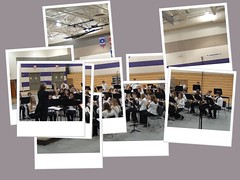 The music teacher in my base school will be helping out again this year, but instead of something random every week she suggested that we put on a combination art show and concert. I was simultaneously thrilled with the idea and embarrassed that I hadn’t suggested it myself, but oh well.
The music teacher in my base school will be helping out again this year, but instead of something random every week she suggested that we put on a combination art show and concert. I was simultaneously thrilled with the idea and embarrassed that I hadn’t suggested it myself, but oh well.
So while she’s teaching the drama and chorus portions of the art club to groups of 15 kids, I’ll be teaching the visual arts portions and having the students work towards producing artworks they feel are worthy of showcasing in the spring. With us staying after school two nights a week, we’ll have 60 students to work with. That’ll give us quite a large show, and I look forward to the challenge.
 Another added bonus is that we have some money left over from last year. It’s only $300, but that’s enough to buy several half-decent digital cameras if you shop around and don’t need 15 megapixel digital SLR cameras complete with macro, wide angle, and telephoto lenses. If I’m lucky I’ll be able to snag some cameras that can record video in addition to stills, but we’ll cross that bridge when I go shopping.
Another added bonus is that we have some money left over from last year. It’s only $300, but that’s enough to buy several half-decent digital cameras if you shop around and don’t need 15 megapixel digital SLR cameras complete with macro, wide angle, and telephoto lenses. If I’m lucky I’ll be able to snag some cameras that can record video in addition to stills, but we’ll cross that bridge when I go shopping.
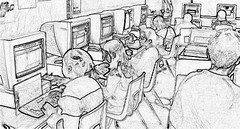 Today many of the art teachers in my county got together for a beginning of the year inservice. Along with the free art material sample packs and lesson workshops, we also had time to hobnob and network.
Today many of the art teachers in my county got together for a beginning of the year inservice. Along with the free art material sample packs and lesson workshops, we also had time to hobnob and network.
 While having lunch with a high school photography teacher, I shared with him my desire to expand my lessons that involve digital photography. He let me know that when his students use digital cameras he tries to get them to do as little post editing as possible, so that he doesn’t cross the line from photography teacher to computer graphics teacher. (His school has one of each, and he doesn’t want to step on his coworker’s toes at all.)
While having lunch with a high school photography teacher, I shared with him my desire to expand my lessons that involve digital photography. He let me know that when his students use digital cameras he tries to get them to do as little post editing as possible, so that he doesn’t cross the line from photography teacher to computer graphics teacher. (His school has one of each, and he doesn’t want to step on his coworker’s toes at all.)
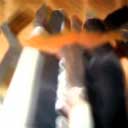 This made perfect sense to me, but as I’m less an art specialist than a jack-of-all-trades, I don’t feel that I need to stick to the same limits. To be honest, my requirement of aligning the art curriculum with other subjects means that the more circles I have in the venn diagram, the more likely I’m doing my job.
This made perfect sense to me, but as I’m less an art specialist than a jack-of-all-trades, I don’t feel that I need to stick to the same limits. To be honest, my requirement of aligning the art curriculum with other subjects means that the more circles I have in the venn diagram, the more likely I’m doing my job.
This also got me thinking about technology. (but then, what doesn’t?)
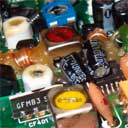 Sometimes I’m referred to as an art teacher who’s into technology, or a technologist who’s into art. Do they really have to be separate things? It’s my opinion that anything that allows for creative expression is art, and therefore fair game for one of my lesson plans. It’s true that there’s some art that normally falls outside of the realm of the digital, but scanning it or taking a picture can quickly change that issue.
Sometimes I’m referred to as an art teacher who’s into technology, or a technologist who’s into art. Do they really have to be separate things? It’s my opinion that anything that allows for creative expression is art, and therefore fair game for one of my lesson plans. It’s true that there’s some art that normally falls outside of the realm of the digital, but scanning it or taking a picture can quickly change that issue.
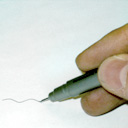 On the other side of the spectrum, I can’t remember the last program or website I’ve seen that didn’t have an artistic touch to it. (The BIOS doesn’t count.)
On the other side of the spectrum, I can’t remember the last program or website I’ve seen that didn’t have an artistic touch to it. (The BIOS doesn’t count.)
I’ll wrap this up with a question from one of my colleagues. Today I was asked if I’d ever considered teaching technology all the time.
I answered without hesitation:
“I already do.”
I have nothing against the land down under, but I can’t even fake a decent Australian accent. I bring this up because a recent posting on a blog called “Using Wiki in Education” gave me a nice write-up, but got that minor detail incorrect.
I’m sure the author, one Stewart Mader, wrote the inaccuracy as an honest mistake. This is unfortunately more than I can say for some others out there.
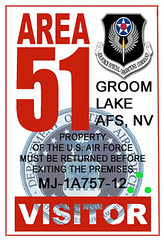 It seems that people wiping their feet on the truth are coming out of the woodwork. Wired News had to pull more than one story by a freelance reporter who faked his sources, Reuters got its own black eye thanks to some doctored photos, and don’t get me started about fake MySpace accounts.
It seems that people wiping their feet on the truth are coming out of the woodwork. Wired News had to pull more than one story by a freelance reporter who faked his sources, Reuters got its own black eye thanks to some doctored photos, and don’t get me started about fake MySpace accounts.
You’d think that at least textbooks would remain pure, with all of the checking and rechecking before they go to print, but no. I’ve used both art and health books (Yes, I taught health. My training as a Boy Scout and the son of an RN worked out well.) where I had to say “The book says this, but in reality, this.”
This all goes to show how much we need to verify our sources, and how much we, as teachers, need to teach our students that not everything they read is true just because someone managed to publish it.
Just think – if we could raise an entire generation of people that weren’t gullible enough to fall for spam, junk email might actually cease to exist. A daydream, I know, but hope springs eternal.
In my last podcast from PA, I talk about what I intend to do with my new thumb drive.
I also briefly mention three good sources for video – SciQ.ca, Archive.org, and unitedstreaming.com.
Why don’t you send me an audio comment?